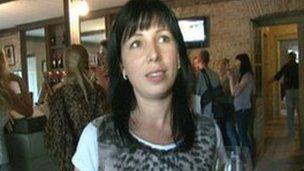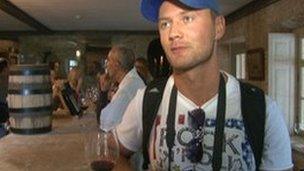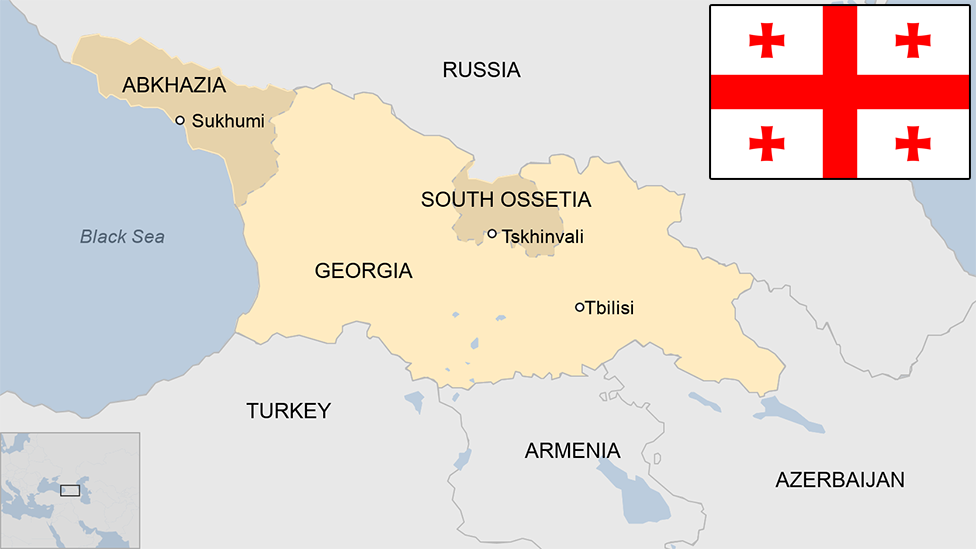Russian tourists return to Georgia despite 2008 war
- Published
Russian tourists return to Georgia after war
A group of smiling tourists laugh and take pictures as they get off a coach in Tbilisi's medieval Old Town.
An elderly Georgian man waves at the group from an ornately carved wooden balcony. And a worker carrying a huge sack of concrete winks cheekily at the blonde women and shouts a greeting in Russian. They giggle.
It is not a reaction they had expected. That is because these tourists are from Russia, a country which fought a war with Georgia four years ago. And whose troops are still stationed in 20% of Georgian territory.
In 2008 Georgia and Russia went to war over the Georgian breakaway region of South Ossetia.
It was a war Russia won. Tens of thousands of Georgians who lived in South Ossetia were forced to flee their homes, leaving everything behind. And today, Russian troops guard checkpoints into South Ossetia to stop them trying to go back.
"I'm really very surprised that people here are so happy to see tourists from Russia," said Zulfiya Nikonova, who is here for the first time. "I was sure there wouldn't even be any Russian tourists, just four years after the war. There are a lot of memories."

Tourists like Zulfiya Nikonova say they are surprised at the lack of hostility
But in the eyes of the Kremlin, Zulfiya is holidaying on enemy territory.
The two countries have no diplomatic relations. Russia is distrustful of the aspirations of this former Soviet Republic to join Nato - viewing Georgia as a traitor to their common history.
And Russian President Vladimir Putin refuses to deal with Georgia's President Mikheil Saakashvili, famously saying that, given the chance, he would hang Mr Saakashvili by his genitals. Except Mr Putin used blunter language.
Despite all this, the Georgian government has embarked on a conscious policy of attracting Russian tourists and businessmen to help boost the economy.
In February visa restrictions for Russians were scrapped. The next month the number of visitors from Russia tripled, says the Georgian government. And in the first four months of 2012, there were 55% more Russian visitors than the same period last year.
More Russians are on their way. In 2011 there were around 300,000 Russian visitors to Georgia, and the government predicts half a million for this year. Quite a leap from 2008, when there were just 100,000.
Tourism is being seen as the key to Georgia's economic development. The government wants to pull in 5 million visitors in total next year, compared to 3 million who came last year.
The Russian market is crucial to achieving this, says Beka Jakeli, from Georgia's government-run National Tourism Agency.
"Russia is the largest growing market. And they're next door. We can't miss out on that."
Sub-tropical hotspot
And Georgia's reputation as a sub-tropical holiday hotspot in the former Soviet Union is also waiting to be tapped into, he argues. "More than three million visitors from Russia used to come to Georgia every year in the Soviet years. So there is an awareness of Georgia as a tourist destination."
But today, with the political conflict still unresolved, it is not an easy market to crack: Georgian tour companies have to fight against negative images of Georgia in Russian state-controlled mainstream media, where Georgia is often portrayed as an unstable country, run by a lunatic president.
After Georgia scrapped visa restrictions for Russian visitors, Russia's foreign ministry even issued a safety warning against travelling to Georgia.

Yuri Krasnoselskikh says fellow-Russians expected Georgia to feel unsafe
Before Yuri Krasnoselskikh came here on holiday, Russians back home frequently asked him if it was not dangerous to travel to Georgia.
"A lot of Russians think it's unsafe because of the tense relations between our countries," he said. "But in reality it's completely different. People here are very friendly, peace-loving and happy."
That's because, despite the war, many Georgians have a great fondness and respect for Russian culture, history and people. "We don't like Putin, but we love Russia," is something you often hear.
Historically many Georgians saw Russia as a civilising force, and the route to Europe - a fellow Christian country, which would offer support against the Muslim Persian and Ottoman empires to the South.
'Painful experience'
So the 2008 war, and the subsequent restrictions on travel and trade with Russia, have been a painful experience for many in Georgia.
The hope is that tourism can help heal those political rifts. The official diplomatic route may no longer be available. But Tbilisi is hoping that individual Russians will be so charmed by Georgia's wine, food, climate and genuinely impressive hospitality that they will act as unofficial ambassadors for Georgia when they go back home.
"There are a lot of lies spread about Georgia," explained Levan Kipiani, from the Georgian tour operator Calypso. "But when people come here, they see what's really going on. Word of mouth undermines the lies the Russian government tells."
On the last night of their trip to Georgia, Yuri, Zulfiya and the other Russians in their tour group sit together with their Georgian hosts, at a long table laden down with traditional Georgian food.
A toast to our beautiful women, declares the toastmaster. Everyone drinks. And then a few minutes later, he says: And now a toast to peace.
Breach of manners
But do not mention the war. Underneath the mutual toasting and proclamations of friendship, politics remains taboo.
Moscow officially recognises the breakaway territories of South Ossetia and Abkhazia as independent states and supports them financially and militarily.
While for Tbilisi, and for most Georgian people themselves, these regions are an integral part of Georgia. And getting them back is a non-negotiable prerequisite for peace with Russia.
Hospitality is a major part of Georgia's culture and national identity - bringing up such issues to a foreign guest would seem an unforgivable breach of manners for many Georgians.
So for tonight, the politics are set aside, the toasts to international friendship carry on, and emotional songs are sung in the heartrending polyphonic style unique to Georgia - and all in Russian.
- Published31 December 2024

- Published29 January 2019